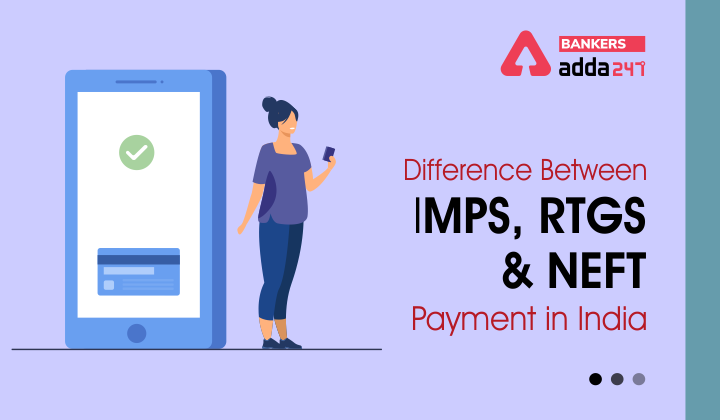Table of Contents
Difference Between IMPS, RTGS & NEFT Payment In India: There are various payment and settlement systems in India that have made the task of transferring money easy. With the advancement of technology, we can transfer a substantial amount of money from one bank account to another bank account with the help of various digital platforms available. To make an online payment we have basically three major online payment systems such as RTGS, NEFT, and IMPS. In recent years, RBI has promoted online payments to make our economy a cashless economy. RBI has reduced the online payment charges so that people move towards the goal of a cashless economy by doing online transactions freely. A lot of government organizations, private companies, and banks are using these online payment systems i.e. NEFT, RTGS, and IMPS. This online system is far more convenient than the traditional system for transferring money. Today in this article we are going to tell you the difference between IMPS, RTGS & NEFT payments in India.
Difference Between IMPS, RTGS & NEFT Payment in India
There are multiple payment options available nowadays such as UPI, Digital wallets, and many more but when there is a need to transfer a hefty amount then people prefer IMPS, RTGS, and NEFT. Now let us first understand what are these payment systems then we will tell you the difference between IMPS, RTGS & NEFT payments in India.
NEFT
The full form of NEFT is National Electronic Fund Transfer. In November 2005, NEFT was introduced by the Reserve Bank of India for facilitating one-to-one funds transfer requirements of individuals/corporates. NEFT is the payment system through which a person having a bank account in any branch can transfer the money to another person having a bank account in another branch. Available across a longer time window, the NEFT system provides for batch settlements at half-hourly intervals, thus enabling near real-time transfer of funds. Certain other unique features viz. accepting cash for originating transactions, initiating transfer requests without any minimum or maximum amount limitations, facilitating one-way transfers to Nepal, receiving confirmation of the date/time of credit to the account of the beneficiaries, etc., are available in the system. From December 2019, it is available 24×7 throughout the year with half-hourly settlements.
RTGS
The full form of RTGS is Real Time Gross Settlement. This was introduced in 2004 by the Reserve Bank of India and settles all inter-bank payments and customer transactions above ₹2 lakh. RTGS is a funds transfer system where the transfer of money takes place from one bank to another on a “real-time” and on a “gross” basis. Settlement in “real time” means payment transaction is not subjected to any waiting period. “Gross settlement” means the transaction is settled on one to one basis without bunching or netting with any other transaction. Once processed, payments are final and irrevocable.
IMPS
The full form of IMPS is an immediate payment service. IMPS is a real-time instant inter-bank fund transfer system which is introduced by the National Payments Corporation of India (NPCI). Through this payment system, the transaction can be conducted on various channels such as Mobile, SMS, ATM, and the Internet.
Difference Between IMPS, RTGS & NEFT Payment in India
In the table given below, we have given the difference between IMPS, RTGS & NEFT payment in India.
| Basis Of Difference | RTGS | NEFT | IMPS |
| Introduced By | RTGS was introduced by RBI | NEFT was introduced by RBI | IMPS was introduced by NPCI |
| Mode of payment | Using RTGS payment can be done both online and offline | Using NEFT payment Can be done online and offline | Using IMPS payment can be done online only |
| Availability | Available 365 days 24×7 | Available 365 days 24×7 | Available 365 days 24×7 |
| Settlement Type | On real-time basis | Half hourly batches | On real-time basis |
| Minimum Transfer Limit | 2 Lakh rupees | Rupee 1 | Rupee 1 |
| Maximum Transfer Limit | No limit | No limit | 2 Lakh rupees |
| Transaction Charges | For inward and online transaction there are no charges.
Charges would be applicable on outward transactions
|
For inward transactions there are no charges | The banks individually decide the charges for remittance through IMPS |
Difference Between IMPS, RTGS, & NEFT Payment in India: Charges
In the table given below, we have covered the charges which need to be paid if the transaction is done online and through bank branches in the case of RTGS and NEFT.
| Payment System | Online Transaction Charges | Transaction Through Bank Charges |
| RTGS | Rupees 10 plus GST | Rupees 56 |
| NEFT | Rupees 5 plus GST | Rupees 25 |
Things To Consider Before Initiating Fund Transfer
- GST– As per the latest norms, the GST will be applicable to the transaction fee.
- Transaction fee- There is some fee which is charged by the bank to provide this service but in case you are receiving the amount then no transaction fee needs to be paid
- Timings- The timings of fund transfer through the above mentioned payment system vary bank-wise.
- Network- In order to transfer money through RTGS, NEFT, and IMPS it is necessary that the bank of both the sender and the receiver is enabled with this system.
Difference Facts About IMPS, RTGS & NEFT Payment in India
Here, we are providing the facts about IMPS, RTGS & NEFT Payment in India.
Facts About NEFT
- Before December 2019, RBI had fixed timings during which NEFT transactions can be processed. Any NEFT transaction will be processed only between 8:00 AM and 6:30 PM from Monday to Friday, and 8:00 AM to 12:00 PM on Saturdays. However, from 2020, NEFT transactions can be performed 24*7
- To transfer funds through NEFT, you must add beneficiaries on the internet banking portal of your required bank
Facts About RTGS
- The transactions to be made through RTGS can be initiated from anywhere using internet banking
- There are no additional charges applicable on the transactions made through RTGS
FAQs: Difference Between IMPS, RTGS & NEFT Payment in India
Q.1 What are the most prevalent methods of online money transfer?
Ans The most prevalent methods of money transfer are UPI, digital wallets, IMPS, RTGS and NEFT. In case of RTGS and NEFT, money can be transferred offline as well.
Q.2 What are the charges if the fund is transferred using NEFT?
Ans RTGS transactions can also be made both online and through bank branches. For transactions made online, the bank charges up to Rs. 10 plus GST and Rs. 56 for transactions done through branches.
Q.3 What is the difference between IMPS, RTGS, & NEFT payment in India?
Ans All the three payment systems have their own benefits. The major difference between IMPS, RTGS & NEFT payment in India is given in the above article.
Recent Posts
| Current Affairs April 2022 | |





 GA Capsule for SBI Clerk Mains 2025, Dow...
GA Capsule for SBI Clerk Mains 2025, Dow...
 The Hindu Review October 2022: Download ...
The Hindu Review October 2022: Download ...
 SEBI Grade A Salary 2025, Revised Pay Sc...
SEBI Grade A Salary 2025, Revised Pay Sc...




